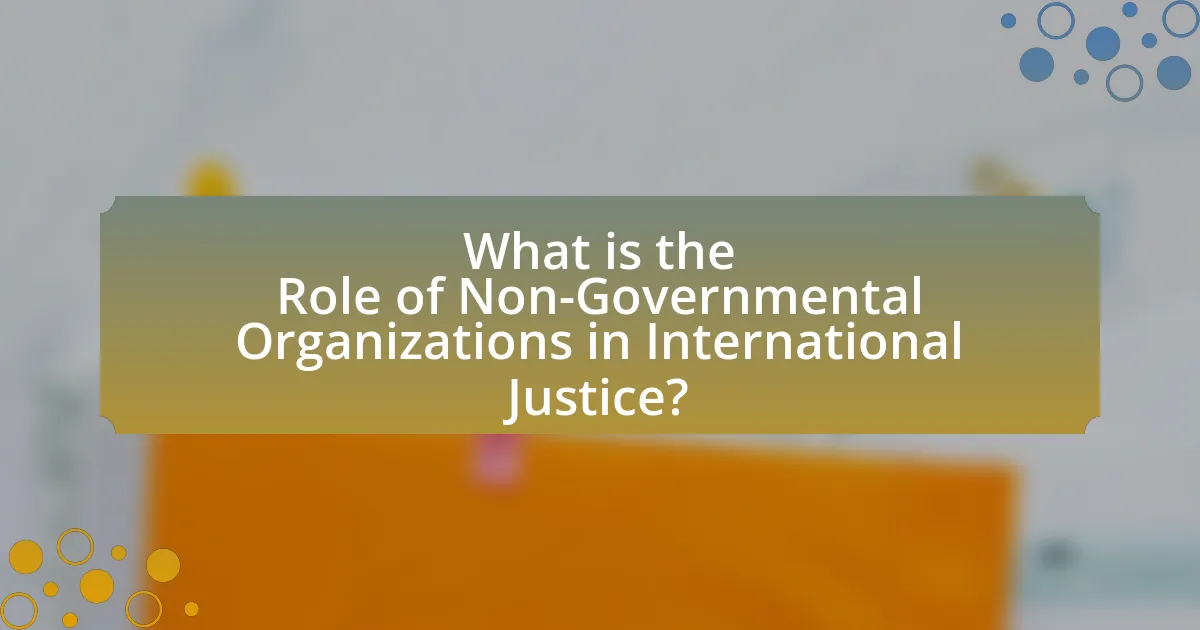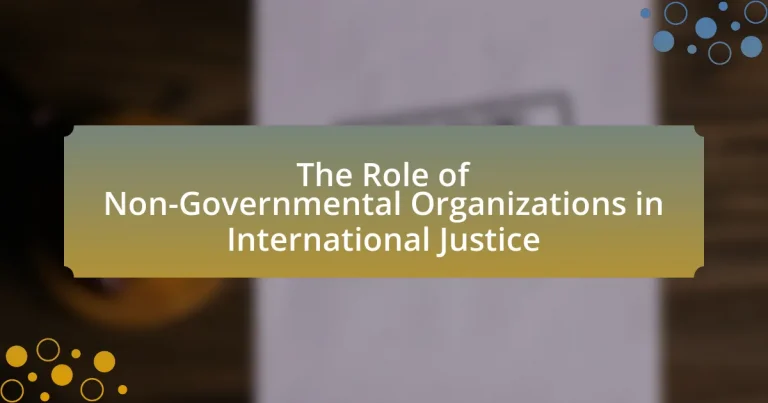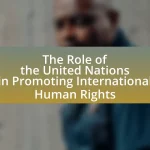Non-Governmental Organizations (NGOs) play a vital role in international justice by advocating for human rights, monitoring violations, and providing legal assistance to victims. Key organizations such as Amnesty International and Human Rights Watch document abuses and influence policy changes at both national and international levels. NGOs engage in various functions, including advocacy, monitoring, and legal support, while facing challenges like funding constraints and political opposition. Their collaborations with governmental and intergovernmental entities enhance their effectiveness, and best practices in advocacy and community engagement further solidify their impact on promoting justice and accountability globally.

What is the Role of Non-Governmental Organizations in International Justice?
Non-Governmental Organizations (NGOs) play a crucial role in international justice by advocating for human rights, monitoring violations, and providing legal assistance to victims. NGOs such as Amnesty International and Human Rights Watch document abuses, raise awareness, and influence policy at national and international levels. For instance, in 2018, Human Rights Watch reported on the plight of Rohingya refugees, which contributed to global pressure on Myanmar to address human rights violations. Additionally, NGOs often collaborate with international bodies like the International Criminal Court to ensure accountability for war crimes and crimes against humanity, thereby reinforcing the rule of law globally.
How do Non-Governmental Organizations contribute to international justice?
Non-Governmental Organizations (NGOs) contribute to international justice by advocating for human rights, providing legal assistance, and holding governments accountable for violations. NGOs such as Amnesty International and Human Rights Watch document abuses, raise awareness, and mobilize public opinion, which can lead to policy changes and legal reforms. For instance, the International Criminal Court has relied on evidence and reports from NGOs to prosecute war crimes and crimes against humanity, demonstrating the significant impact these organizations have on promoting justice globally.
What specific functions do NGOs perform in the realm of international justice?
NGOs perform several specific functions in the realm of international justice, including advocacy, monitoring, and providing legal assistance. Advocacy involves raising awareness about human rights violations and influencing policy changes at national and international levels, as seen in the work of organizations like Amnesty International, which campaigns against torture and unlawful detention. Monitoring entails documenting abuses and reporting on compliance with international laws, exemplified by Human Rights Watch, which publishes detailed reports on human rights conditions in various countries. Additionally, NGOs often provide legal assistance to victims of injustice, helping them navigate legal systems and access justice, as demonstrated by the International Justice Resource Center, which offers resources and support for individuals seeking accountability for human rights violations. These functions collectively contribute to the promotion and enforcement of international justice standards.
How do NGOs influence policy and legal frameworks related to international justice?
NGOs influence policy and legal frameworks related to international justice by advocating for human rights, providing expert knowledge, and mobilizing public opinion. These organizations engage in lobbying efforts to shape legislation and international treaties, often presenting research and case studies that highlight injustices and the need for legal reforms. For example, NGOs like Human Rights Watch and Amnesty International have successfully campaigned for the establishment of the International Criminal Court, demonstrating their ability to affect international legal structures. Additionally, NGOs often collaborate with governmental bodies and international organizations, providing critical data and recommendations that inform policy decisions, thereby reinforcing their role as key stakeholders in the international justice system.
Why are Non-Governmental Organizations important in promoting human rights?
Non-Governmental Organizations (NGOs) are crucial in promoting human rights because they advocate for the protection and enforcement of these rights on a global scale. NGOs often serve as watchdogs, monitoring government actions and holding authorities accountable for human rights violations. For instance, organizations like Amnesty International and Human Rights Watch document abuses and mobilize public opinion, influencing policy changes and international responses. Their ability to operate independently from government influence allows them to address issues that may be overlooked or suppressed, thereby amplifying the voices of marginalized communities. Additionally, NGOs provide legal assistance, education, and resources to empower individuals and communities to claim their rights, further solidifying their role in the promotion of human rights.
What role do NGOs play in advocating for victims of human rights abuses?
NGOs play a crucial role in advocating for victims of human rights abuses by providing support, raising awareness, and influencing policy changes. They document violations, offer legal assistance, and create platforms for victims to share their experiences, thereby amplifying their voices. For instance, organizations like Amnesty International and Human Rights Watch conduct extensive research and publish reports that highlight specific cases of abuse, which can lead to international pressure on governments to act. Additionally, NGOs often engage in lobbying efforts to promote legislative reforms that protect human rights, demonstrating their impact on both local and global scales.
How do NGOs facilitate access to justice for marginalized communities?
NGOs facilitate access to justice for marginalized communities by providing legal assistance, advocacy, and education. They often offer pro bono legal services, helping individuals navigate complex legal systems that they might otherwise find inaccessible. For instance, organizations like the Legal Aid Society in the United States have historically provided representation to low-income individuals, ensuring their rights are upheld in court. Additionally, NGOs engage in advocacy efforts to influence policy changes that benefit marginalized groups, such as pushing for reforms in laws that disproportionately affect them. Research shows that NGOs play a critical role in raising awareness about legal rights, which empowers communities to seek justice and hold authorities accountable.
What challenges do Non-Governmental Organizations face in their work?
Non-Governmental Organizations (NGOs) face several significant challenges in their work, including funding constraints, political opposition, and operational limitations. Funding constraints arise as many NGOs rely on donations and grants, which can fluctuate based on economic conditions and donor priorities. Political opposition often manifests in restrictive regulations or hostility from governments, particularly in authoritarian regimes, hindering their ability to operate freely. Operational limitations include logistical issues, such as access to remote areas or conflict zones, which can impede the delivery of services and aid. According to a report by the International Council of Voluntary Agencies, 70% of NGOs reported difficulties in securing adequate funding, while 60% faced challenges related to government restrictions on their activities.
How do political environments impact the effectiveness of NGOs in international justice?
Political environments significantly impact the effectiveness of NGOs in international justice by influencing their operational freedom, funding availability, and public perception. In authoritarian regimes, NGOs often face restrictions on their activities, limiting their ability to advocate for justice or provide support to victims. For example, in countries like Russia and China, stringent laws regulate NGO operations, leading to decreased effectiveness in promoting human rights and accountability. Conversely, in democratic settings, NGOs typically enjoy greater freedom to operate, access to funding, and support from civil society, enhancing their capacity to influence policy and mobilize public opinion. Research by the International Center for Not-for-Profit Law indicates that favorable political environments correlate with increased NGO effectiveness in advocating for justice reforms and holding governments accountable.
What are the funding challenges that NGOs encounter in their operations?
NGOs encounter several funding challenges in their operations, primarily including reliance on inconsistent donor funding, competition for limited resources, and restrictions imposed by funding sources. Inconsistent donor funding can lead to financial instability, as many NGOs depend on grants and donations that may fluctuate annually. Competition for limited resources is heightened as numerous organizations vie for the same pool of funds, making it difficult for some NGOs to secure necessary financing. Additionally, restrictions imposed by funding sources often dictate how funds can be used, limiting the operational flexibility of NGOs and potentially hindering their ability to respond effectively to emerging needs. These challenges are documented in various studies, such as the “Global Trends in NGO Funding” report by the International NGO Training and Research Centre, which highlights the impact of funding volatility on NGO sustainability.
How do Non-Governmental Organizations collaborate with other entities?
Non-Governmental Organizations (NGOs) collaborate with other entities through partnerships, coalitions, and networks to enhance their impact on international justice. These collaborations often involve working with governmental bodies, international organizations, and other NGOs to share resources, expertise, and information. For instance, NGOs may join forces with the United Nations to advocate for human rights or partner with local governments to implement community-based programs. Evidence of this collaboration can be seen in initiatives like the Global Fund to Fight AIDS, Tuberculosis and Malaria, where NGOs play a crucial role in mobilizing resources and delivering services in partnership with various stakeholders.
What partnerships do NGOs form with governmental and intergovernmental organizations?
NGOs form partnerships with governmental and intergovernmental organizations primarily to enhance their capacity to address social issues, influence policy, and implement programs effectively. These collaborations often involve joint initiatives, funding agreements, and advocacy efforts aimed at promoting human rights, environmental sustainability, and social justice. For instance, NGOs like Amnesty International collaborate with the United Nations to monitor human rights violations and provide recommendations for policy changes. Such partnerships leverage the resources and authority of governmental bodies while allowing NGOs to bring grassroots perspectives and expertise to the table, thereby creating a more comprehensive approach to international justice.
How do NGOs engage with local communities to enhance their impact?
NGOs engage with local communities through participatory approaches that foster collaboration and empower residents. By involving community members in decision-making processes, NGOs ensure that initiatives are tailored to local needs and cultural contexts. For instance, a study by the International NGO Training and Research Centre (INTRAC) highlights that NGOs that prioritize community input in program design see a 30% increase in project effectiveness. This engagement not only builds trust but also enhances the sustainability of interventions, as local stakeholders are more likely to support and maintain initiatives they helped create.
What are the best practices for Non-Governmental Organizations in international justice?
The best practices for Non-Governmental Organizations (NGOs) in international justice include advocacy for legal reforms, collaboration with local communities, and the use of evidence-based research to support their initiatives. NGOs should engage in advocacy to influence policy changes that promote justice and accountability, as seen in the work of organizations like Human Rights Watch, which has successfully lobbied for international legal standards. Collaboration with local communities ensures that the needs and perspectives of affected populations are prioritized, enhancing the relevance and effectiveness of justice initiatives. Furthermore, employing evidence-based research, such as reports documenting human rights abuses, strengthens the credibility of NGOs and informs their strategies, as demonstrated by the International Federation for Human Rights, which utilizes comprehensive data to drive its campaigns. These practices collectively enhance the impact of NGOs in the realm of international justice.
How can NGOs effectively measure their impact on international justice?
NGOs can effectively measure their impact on international justice by utilizing a combination of quantitative and qualitative metrics. Quantitative metrics include tracking the number of legal cases supported, the amount of funding allocated to justice initiatives, and statistical changes in legal outcomes in regions where they operate. Qualitative metrics involve gathering testimonials from affected communities, conducting surveys to assess changes in public perception of justice, and analyzing policy changes influenced by their advocacy efforts. For instance, a study by the International Justice Resource Center found that NGOs that documented and reported on human rights abuses contributed to increased accountability and legal reforms in various countries, demonstrating a direct correlation between their activities and improvements in international justice systems.
What strategies can NGOs employ to improve their advocacy efforts?
NGOs can improve their advocacy efforts by employing strategies such as building coalitions, utilizing social media, and engaging in targeted lobbying. Building coalitions with other organizations enhances collective influence and resource sharing, which is crucial for amplifying messages and reaching broader audiences. For instance, the Global Network of Women Peacebuilders successfully united various NGOs to advocate for women’s rights in conflict zones, demonstrating the power of collaboration. Utilizing social media platforms allows NGOs to disseminate information rapidly and engage with supporters directly, as seen in campaigns like #MeToo, which mobilized global awareness and action. Targeted lobbying involves identifying key decision-makers and tailoring messages to influence policy changes effectively; for example, the Human Rights Campaign has successfully lobbied for LGBTQ+ rights by focusing on specific legislative targets. These strategies, supported by successful case studies, illustrate how NGOs can enhance their advocacy efforts.


